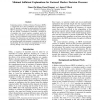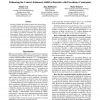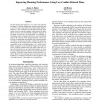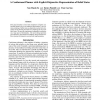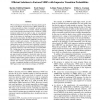68
Voted
AIPS
2009
15 years 1 months ago
2009
AIPS
2009
15 years 1 months ago
2009
Explaining policies of Markov Decision Processes (MDPs) is complicated due to their probabilistic and sequential nature. We present a technique to explain policies for factored MD...
100
click to vote
AIPS
2009
15 years 1 months ago
2009
The growing presence of household robots in inhabited environments arises the need for new robot task planning techniques. These techniques should take into consideration not only...
98
Voted
AIPS
2009
15 years 1 months ago
2009
Planning systems for real-world applications need the ability to handle concurrency and numeric fluents. Nevertheless, the predominant approach to cope with concurrency followed b...
AIPS
2009
15 years 1 months ago
2009
Recently, Helmert and Geffner proposed the context-enhanced additive heuristic, where fact costs are evaluated relative to context states that arise from achieving first a pivot c...
76
Voted
AIPS
2009
15 years 1 months ago
2009
The FF relaxed plan heuristic is one of the most effective techniques in domain-independent satisficing planning and is used by many state-of-the-art heuristic-search planners. Ho...
101
Voted
AIPS
2009
15 years 1 months ago
2009
The ability to automatically compose Web Services is critical for realising more complex functionalities. Several proposals to use automated planning to deal with the problem of s...
77
Voted
AIPS
2009
15 years 1 months ago
2009
This paper describes a novel and competitive complete conformant planner. Key to the enhanced performance is an efficient encoding of belief states as disjunctive normal form form...
120
click to vote
AIPS
2009
15 years 1 months ago
2009
We define the robustness of a sequential plan as the probability that it will execute successfully despite uncertainty in the execution environment. We consider a rich notion of u...
114
Voted
AIPS
2009
15 years 1 months ago
2009
When modeling real-world decision-theoretic planning problems in the Markov decision process (MDP) framework, it is often impossible to obtain a completely accurate estimate of tr...

